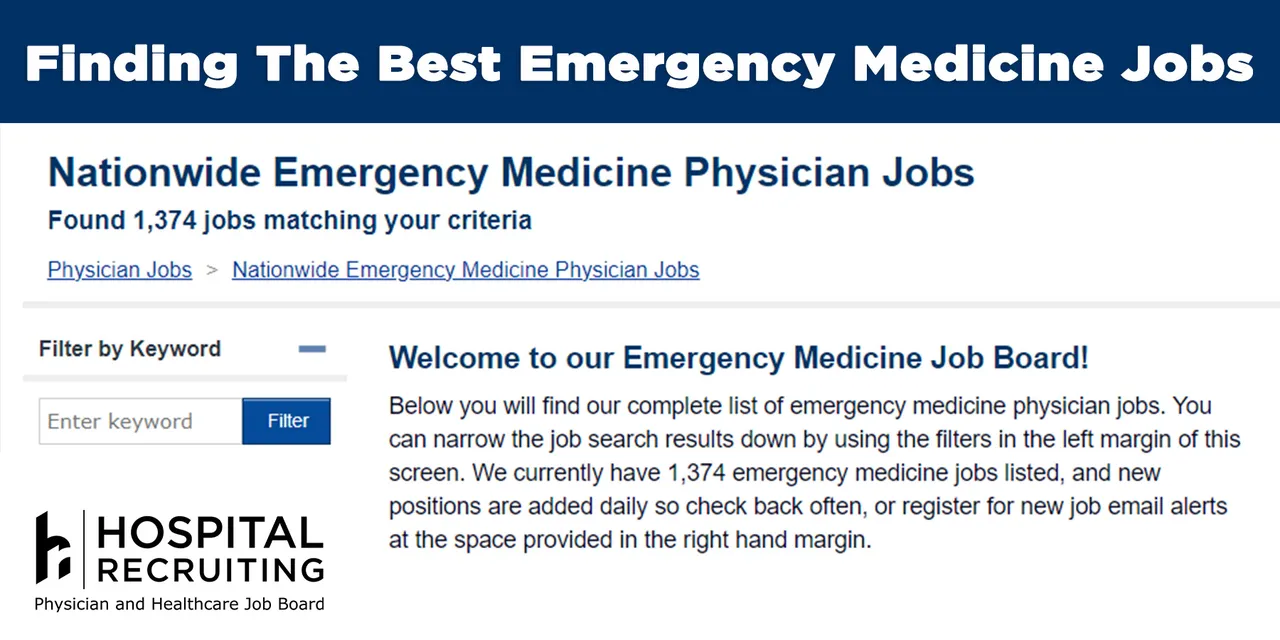How To Find the Best Emergency Medicine Jobs

The job market can be overwhelming. There are many ads that overpromise and underdeliver. Hospitals that are only hiring because they’ve driven off all of their best employees. Countless pages that provide half the story, only to collect your personal information and never return your call.
The job search can be made easier by understanding the process. Since the characteristics that make a job ‘great’ are subjective, I’ve listed a few ways below to better keep the process in perspective. The goal is to narrow down the search to a few acceptable solutions that still allow you to have the lifestyle you’re seeking.
Put your job search in perspective
Searching for a perfect job in emergency medicine is like searching for the perfect partner. They simply do not exist and the more time you spend looking for them, the more disappointed you will become.
As you search for jobs, understand that the job you finally agree to is likely temporary. It is commonly held that most physicians will change jobs within their first three to five years of practice. There’s a good chance that in the next few years, you’ll either leave the job you’re currently seeking or the nature of that job will change.
Understanding this will take a lot of the pressure from your current search. Your next job is probably temporary and you aren’t missing out on the perfect job by taking one that suits your current needs.
Identify the “big bucket” characteristics of the job you’re seeking
The best outcomes will happen when you know what you are looking for before starting the search.
Many job seekers scroll through physician job listings hoping that the right job will pop out at them. Doing this puts you in a reactive position. Instead, proactively identify the big picture items you must have prior to your search. This will prevent the error of being attracted to jobs that sound great but don’t give you what you need.
Do you want…
- An academic or community setting?
- A rural, urban or suburban environment?
- What patient volume are you comfortable with?
- Is it important to you whether you are employed or an independent contractor?
- What state, region or city do you want to work in?
- Are you OK with being hired by a system and working in several EDs? Or, do you only want to work in one?
- How much do you need to work?
As you progress through the job application process, details will emerge that can make or break a particular option for you. For example, an ED that sees a significant amount of geriatric or pediatric patients may not be for you. Or, an ED with 24-hour shifts may sound like a dream or a nightmare. But having a sense of these larger characteristics will put you in the right ballpark as you begin your process and get you to a point where you can focus on details.
Do your homework.
You will probably start your search with a physician job board. There are many available and each has its benefits. HospitalRecruiting.com, for example, has over 1300 available EM jobs, does not send junk email, and offers a confidential signup. Doximity has a job database but also a social media function. LinkedIn provides advanced search and notification functions that can facilitate the job search process.
Once you’ve identified a job you’re interested in, cross reference what you’ve found on multiple job boards. A single job with multiple postings from several staffing companies may help you secure a better salary or provide information that will be helpful in negotiation.
Job postings are often vague with the names of particular hospitals but this is very easy to uncover with simple online searches. This sort of background check is worth your time. Once you’ve figured out the name of a facility, you can search for it in the news or other public facing websites. You will be able to see if they have legal, safety, healthcare worker experience or other issues that have created the opening you are applying for.
Also remember that emergency medicine is a relatively small field. Everyone is connected to everyone. So, use your medical school and residency connections to learn about facilities you’re interested in. If you can find a connection and get a chance to pick their brain, you can gain invaluable inside information.
Consider locum tenens
Locums is a great way to explore a hospital or a region without a permanent commitment. This is especially worth considering if you’re on the fence about moving to a new geographic region.
A locums job may not be available at the specific hospital you’d like to work in. But, there may be an option in the region. This is helpful because you will be working with locals who know the landscape very well. Even if you aren’t working exactly where you want to, you will get very helpful information about the patients in that region, the reputation and inside scoop on local hospitals or what life outside of the hospital actually looks like.
You can arrange for shorter term locums contracts (on the order of months) and work in a region of interest. This is plenty of time to make connections, get a feel for the area and narrow down whether moving there is a good move for you or not.
There are many locums companies online to work with. A simple search for “Locum tenens emergency medicine jobs” will provide many opportunities.
Plan for a life, not a job
Work is a portion of your life, it is not your entire life. Planning to squeeze your life in around a good job is a recipe for burnout.
Your spouse and/or children, your hobbies, travel, other career interests – all things that will ultimately matter much more to you than your job. Identify what these are and build them into your job search. Does the new position allow you live your life or does it require you to build your life around it?
Related Posts
